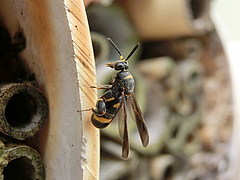Tree phylogenetic diversity promotes host-parasitoid interactions

Wasps are being infested by parasitoids.
Note for the media: Use of the pictures provided by iDiv is permitted for reports related to this media release only, and under the condition that credit is given to the picture originator.
Interactions between parasitoids and their hosts are central processes in terrestrial ecosystems. A new study shows that in a subtropical forest the phylogenetic diversity of trees positively affects the abundance of parasitoids and with it the amount of parasitism. While this correlation is strong for tree phylogenetic diversity, which describes the diversity of evolutionary lineages, it is much weaker for the pure number of tree species (“species richness”). This indicates that even forests with many tree species may be vulnerable to habitat change, if the evolutionary most distinct plants go extinct.
The results are published in the current issue of “Proceedings of the Royal Society B“. iDiv scientists Helge Bruelheide, Walter Durka and Oliver Purschke contributed as co-authors.
http://rspb.royalsocietypublishing.org/content/283/1834/20160275
